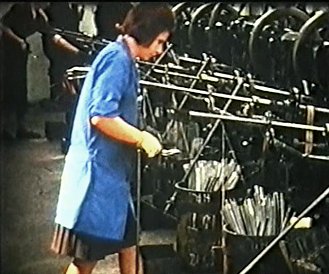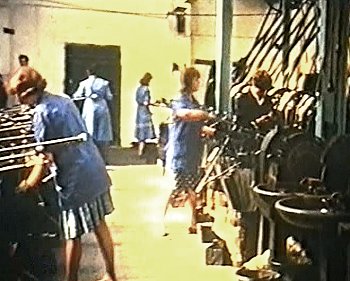|
A Family Business
The Crown Nail Company was a family
business in more ways than one. Many of the people in the
factory were related, in fact at one time you couldn’t get a job
at the company unless you already had a relative working there.
This led to a friendly atmosphere in the works that prevailed
until the end. Anyone would willingly help anyone else if they
had a problem and people would always come forward with ideas
for improvements in the factory, a very different state of
affairs to what prevailed in most industries.
|
|

Ken Farrington. |
Whole families sometimes worked in the factory.
There were John Morris and his two sons, Joe and William; the
three Astil brothers Reg, Percy and Charlie; the Thompsons; Roy
Peach, who was a tack setter and foreman and had 49 years
service; and many more. In fact most of the workers were long
serving employees, often with 20 or 25 years service.
Works Manager, Ken Farrington, started as an apprentice on 21st
February 1954 and stayed until the end, having achieved nearly
51 years service. Several other members of his family were also
employed at one time or another. His wife Joan worked in
packing, and his sons Kevin and Linden, and brother John worked
in the factory. His brother-in-law Garry Harper also worked
there.
When Ken started his apprenticeship the Works Manager was
Cyril Haydon, a strict disciplinarian. His brother Harold worked
in the fitting shop and Ken remembered Cyril as follows: |
|
“I worked in the fitting shop where we
were making machines and spare parts. Five of us were in there,
six on one occasion. You never had a day doing nothing, not even
ten minutes or half an hour. Cyril Haydon would be there with
his brother Harold setting-up a capstan or lathe, so we moved
directly from one job to the next.
You had to have a note book and if they
were showing you a job, you had to write down the instructions.
|
| You were only shown a job a couple of times.
You had to write down the sequences and the settings of the
machine. If you went back on a third occasion to ask how to do
the job you got told off.
You couldn’t leave a machine or a space dirty with swarf or
anything like that, it all had to be cleaned-up. Friday
afternoon was sweeping the fitting shop, and not only did you go
round with an ordinary sweeping brush, but also a 10 inch long
pencil brush to get into the corners. Cyril would go round
afterwards to check that everywhere was clean. We all did it, we
had to take our turns.
|

The tack shop in the 1960s.
Courtesy of Mary Ashleigh. |

Another view of the tack shop in the mid
1960s. Courtesy of Mary Ashleigh. |
If we hadn’t got a full quota of girls, he
would put on his leather jacket and go to a girl’s house on his
Velocette motorcycle to find out why she hadn’t turned up. Eric
Odie was off ill and Cyril went to see why he hadn’t come in.
When Cyril arrived he was sitting in the sun and so he was
suspended for two days without pay. |
| I used to go to “tech” in Walsall Street and later to
the South Staffordshire College of Technology. I had a day
release and went three evenings a week. I came from a Church of
England school in Essington and we didn’t do algebra and weren’t
up to the standard of a lot of other schools. I found it very
difficult, but there were some good old teachers who would help.
They sent a report every quarter. I met a fella there, Kenny
Butler. The last lesson was technical drawing and neither of us
were much good at it so he would say “shall we have a game of
snooker?”. I had never done things like that before but we went
to the snooker hall above Burtons in the town centre. This was
reported to Cyril Haydon and so I came clean and told him I was
not very good at technical drawing. The next thing I knew he was
off to see my father, telling him that it was no good me wasting
time. My father had to ensure that I wouldn’t do it again.” |

|
|
 |
|

|
Return to
New Beginnings |
|
Return to
the Contents |
|
Proceed to
Memories |
|